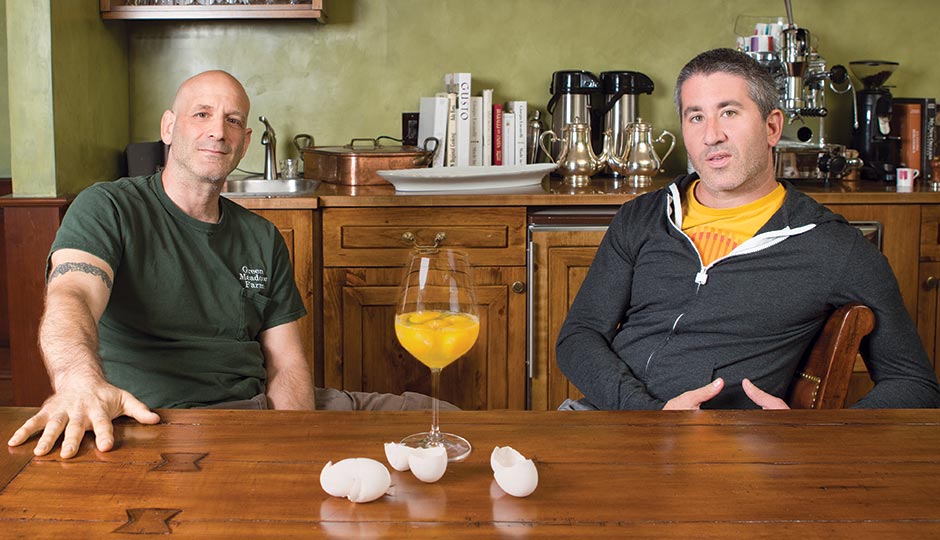Michael Solomonov and Marc Vetri on Being a Celebrity Chef in Philadelphia

Marc Vetri and Michael Solomonov. Photograph by Dustin Fenstermacher
[Sitting in Vetri’s recently renovated upstairs private dining room]
Michael: Wow, look at this. I used to sleep on a cot in that corner.
Marc: Yeah, it used to be this crappy apartment.
PM: When Michael worked for you, Marc, did you notice his talent right away? Can you spot talent?
Marc: I used to think that I could really figure folks out when they walked into the kitchen. But after a certain amount of time — ya know, two months, three months — they can walk out and you never see them again. They leave their knife bag and everything. They are just gone. So I really don’t think I can say that anymore.
Michael: It’s a generational thing, because when you and I first met, there certainly wasn’t anything like that happening here.
Marc: That didn’t happen until the last four years, five years. People who you think, “This guy’s got it. He’s amazing,” and then someone says, “Oh, Chef, he walked out a half hour ago.”
PM: What’s changed?
Marc: It’s a little bit of pressure, and not a realistic thought about what the work is going to be. When we started in this industry, there were no bones about it. You were going to work 80 hours a week, you were going to work six, seven days a week —
Michael: And you are going to make no money.
Marc: And maybe, one day, you know, if you are really lucky, you can own your own restaurant. And that’s the goal. I’ve made it, I can have a family, I can have a nice life. But now, that’s almost the expected. Am I going to own my own restaurant? Of course. I’m going to open up multiple restaurants, and I’m going to have a show and a cookbook deal.
Michael: I think it’s okay, as long as people wait for it and work for it. When I first started, I just wanted to own my own restaurant. I remember when it was me and Jeff [Michaud, of Osteria] and Nico [Dionicio Jimenez, of El Rey] sitting at that table … what’s the romantic table?
Marc: Table five.
Michael: We were sitting there one night drinking prosecco, and you were like, “I don’t have any desire for anything else, all I want is this.” But things are very different.
Marc: But that was the goal, we were three years open …
Michael: You worked all the fucking time. You worked for free in Italy. And I think people just don’t have the patience for that now.
Marc: I’ve definitely switched the mind-set. I was reading something that Mark Cuban said recently … something like, to be successful, you have to work like someone else is working 24 hours a day to steal your job. I have this conversation with my line cooks all the time. I tell them that if they walk in here and do their job, show up on time and leave when it’s over, do everything that I ask them to do, nothing more, they will fail in this industry. That is just the way it is.
PM: So what do you see in people that makes them stand out?
Michael: It’s people who are using every opportunity to be outgoing or to take risks. When I worked here, on day one — day one — we came in at 9 a.m. to make chocolate. It was six days a week, Jeff was tempering chocolate, Sal [Vetri’s dad] came in and would make antipasto …
Marc: We were making sausage, went to the farms …
Michael: It wasn’t required. It just was what it was.
Marc: It was like, “Hey, I’ll be here tomorrow morning. If you guys want to stop in and watch, feel free.”
PM: You guys also like to teach.
Michael: That’s different now, though. I have people at Zahav that have worked for me that do the teaching now. You have your unique skills and feedback, but getting people generally fired up and turning them into leaders — that’s the job I think we have now.
Marc: Sure. Someone like Michael and Michaud and Adam [Leonti, executive chef at Vetri] and Brad [Spence, executive chef at Amis], those are the guys that hound me. Those are the ones that make their way forward in the industry. It’s an awesome synergy, also, because I can remain stagnant, but if I have these young guys pressing me to learn, then I get excited, and I get motivated.
Michael: And working next to someone that owns the restaurant is a totally different experience.
PM: When did you leave here?
Michael: In 2005. I was here for three years.
Marc: The issue was that I had this [Vetri], and that was it. There was nowhere else for them to go. I would throw them out after two years, saying you should be leaving
soon. But now I can have partners in the whole thing, and there is definitely room for others. Now we have that opportunity. When it was only the 30-seater, I didn’t have enough money to give myself a good
salary — how was I going to give them a raise? It was impossible.
Michael: I went from here to Marigold. There was a question of what I was going to do next. I was thinking of going to New York, or with Luke Palladino at the Borgata. I had just gotten engaged to my wife, too.
Marc: Then? You were with Mary when you were working with me?
Michael: Yeah. Remember? I put her engagement ring in the safe downstairs. That was part of Jeff Benjamin’s lineup that night. He was like, “Nobody say anything,” because Mary’s family came in to have dinner and I wanted to ask their permission first.
PM: So you both are on a tear of opening restaurants lately — Abe Fisher, Lo Spiedo, Dizengoff, and a new Pizzeria Vetri in Rittenhouse. Do you think there’s a saturation point in Philly?
Michael: I do.
Marc: Me too, yeah. Now when you read about openings, there’s a list of 30 restaurants. I started here in 1998; in 2001, everyone was writing that there are so many restaurants here, that it has to stop. I was like, “What are you talking about? There are no restaurants here.” But now there are a lot of options, and Philadelphia is a small city. There aren’t that many people who are eating out two nights a week.
Michael: It’s a little harder here, too, because you are trying to not be redundant but still figure out a niche.
Marc: But I think Philly is very supportive of the food scene. Yeah, there is a lot, but it still makes sense as long as all the restaurants can sustain. I think now the level of the restaurants here is equal to or even better than, more interesting than, New York.
Michael: We have to try harder here. It’s easier in bigger cities that have more of a saturation of wealth, like New York. It’s probably the best restaurant city, but there are also restaurants there that get along just fine and they totally fucking suck.
Marc: I think Philadelphians are actually more discerning about food than New Yorkers are. So, like, a mediocre restaurant will maybe make it in New York, but they’ll get slaughtered here.
PM: The restaurants that you open are increasingly casual. Does Philly only want casual places?
Michael: That’s what everyone wants.
Marc: I disagree with that. The Navy Yard place [Lo Spiedo] is casual, but it’s also at a certain level.
Michael: But that’s the thing — it’s not casual. It’s just under the guise of being casual.
Marc: But Philadelphia needs more restaurants like Vetri. Really, you are in the hands of the chef, but it’s thoughtful, innovative, but relaxed, with a real focus on service. I don’t think there are enough of those.
PM: Do you think that’s what happening on East Passyunk?
Marc: No. I think a lot of those restaurants are really fun and they have awesome food, but they aren’t customer-service-oriented, the way it ought to be at even the most casual place. That’s the thing: Even at our pizzeria, we are never taking for granted that you have made the decision to eat at one of our restaurants.
Michael: It’s a mind-set you have to instill. This is a line that we use a lot at our lineups at Zahav: ‘The guests have a choice to eat at 10,000 restaurants a night, and they’ve chosen ours, so identify what it is going to take to make them feel special.” We are here to make memories, regardless of whether it’s barbecue, Israeli food, doughnuts, whatever. It’s exhausting; it’s all about sacrifice and being so unselfish. At Abe Fisher, that first ticket came in and we were like, Oh, we have to adjust. The menu wasn’t there yet.
Marc: [laughs, nods]
Michael: But that’s what makes it a restaurant. The chef is, in a way, a small part of the actual experience. The food has to be perfect and great, but we are dealing with the most subjective thing in the world, right? And to go back to what Marc was saying, you’ve got these guys that are all tricking food out, but what does that mean to the guest? How many people are eating thinking, This deconstructed, pulled-apart, beautiful-looking plate takes me back to my childhood? Or, This is as good as what it’s trying to mimic? Or, Sweet spoon drag, dude? I don’t think people give a shit. They want to have a great fucking night with their hard-earned money. You have to do what makes you happy, but I think it’s completely irresponsible to just be driven by your ego. You have a responsibility … I don’t know. How many employees do you have?
Marc: Three hundred fifty. It’s going up to 400 after Lo Spiedo.
Michael: So yeah, we have about half of that, but every day when I wake up, I am thinking about that. About our homes that are on the line —
Marc: Health insurance for all my employees.
Michael: Nursery school for my kids, and also thinking about maximizing value for the guest. So it’s very little about us at the end of the day.
Marc: The goal is to make the diner have a really amazing experience. I’ve sat in on a lot of these chef-y sort of advice-panel things, and a lot of chefs say, “You know, you open a restaurant and the curtain raises up and it’s theater. And the show goes on.” And I’m thinking to myself, That is just the dumbest advice you can give. It’s not a show; it’s not buying a ticket to an event. You don’t walk into a theater and they’re in the middle of a scene, and you stand up and say, “Hey, I don’t like that scene, do you think you can actually do the other one again?” No. That’s art and theater. This is dining at a restaurant, and I want to make you happy. Yes, there is a line where I have a certain style of food that I make, and yes, you want to see it, but I don’t want to force you to eat things that you don’t like. I want to make a memory happen for you. Ten years from now, when you’re thinking about your anniversary dinner here, I don’t want you to remember that you ate this and this and this. I would prefer you say, “Hey, remember that anniversary night we had at Vetri 10 years ago? That was an awesome night.”
Originally published in the November 2014 issue of Philadelphia magazine.
Read more from our Conversation Issue.



